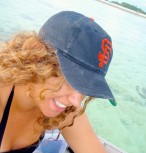DNA reveals the past and future of coral reefs
New DNA techniques are being used to understand how coral reacted to the end of the last ice age in order to better predict how they will cope with current changes to the climate. James Cook Univer

From 2005 to 2022, the main node of the ARC Centre of Excellence for Coral Reef Studies was headquartered at James Cook University in Townsville, Queensland (Australia)








Abstract: The distribution and diversity of species is changing in response to global climate change, particularly increased temperature. However, the specific biotic response, both within and between species, is often dependent on geographical location. For instance, the greatest negative effects of warming are expected to occur in the tropics because tropical species tend to have a narrower range of thermal tolerance when compared with higher latitude species. Coral reef ecosystems are expected to be at a particularly high risk from increased temperatures because thermal anomalies as little as 1°C above average annual summer maximums can cause mass bleaching in adult coral assemblages. Evidence suggests that raised temperatures may also be deleterious to coral larvae (the dispersive life stage), which are crucial for recruitment and replenishment in coral reef ecosystems. However, studies into the effects of temperature on these early life stages have so far been limited to single locations and upper thermal limits. Therefore, the aims of my PhD were to 1) determine thermal tolerance ranges of early development and survival of coral larvae 2) assess the extent to which this tolerance varies across space, specifically I aimed to test whether high latitude species have a broader tolerance and 3) test whether difference between adult coral assemblages across a hypothesized dispersal barrier (Great Barrier Reef to Lord Howe Island) can be predicted by life history traits related to the dispersive larval stages (e.g., mode of larval development, mode of larval nutrition), adult ecology, and/or environmental parameters. To address these aims, I combined small-scale larval experiments at three sites along the east coast of Australia, and large-scale biogeographical analyses. My major findings were that 1) raised temperatures increased the proportion of abnormal embryos, decreased larval lifespan and increased the rate of embryonic development, 2) coral embryos from higher latitudes possessed greater thermal tolerance ranges and 3) the mode of larval development and corallite size were predictors for the differences in coral cover between the Great Barrier Reef and Lord Howe Island. My results support the hypothesis that corals living in regions characterized by larger temperature fluctuations have wider breadths of thermal tolerance. Although local temperature ranges projected by the end of the century exceed thermal tolerance breadths found for each location, rising temperatures pose a greater threat to low-latitude coral populations. Furthermore, the effects of ocean warming are likely to vary among species, and species that brood and have smaller corallites may be better equipped to survive through changing climates because they are successful in marginal conditions..
Biography: Erika grew up in the San Francisco Bay Area and attended Duke University in North Carolina for her undergrad. She moved to Australia in 2007 and received her Masters of Applied Science from the University of Sydney. She began her PhD at the ARC Centre of Excellence for Coral Reef studies in 2010 under the supervision of Andrew Baird, Sally Keith, and Maria Byrne..
New DNA techniques are being used to understand how coral reacted to the end of the last ice age in order to better predict how they will cope with current changes to the climate. James Cook Univer
A new study on the effects of climate change in five tropical countries has found fisheries are in more trouble than agriculture, and poor people are in the most danger. Distinguished Profess
James Cook University researchers have found brightly coloured fish are becoming increasingly rare as coral declines, with the phenomenon likely to get worse in the future. Christopher Hemingson, a
Researchers working with stakeholders in the Great Barrier Reef region have come up with ideas on how groups responsible for looking after the reef can operate more effectively when the next bleaching
Abstract: As marine species adapt to climate change, their heat tolerance will likely be under strong selection. Individual variation in heat tolerance and its heritability underpin the potential fo
Abstract: The Reef Ecology Lab in KAUST’s Red Sea Research Center explores many aspects of movement ecology of marine organisms, ranging from adult migrations to intergenerational larval dispersal
Abstract: Macroalgal meadows are a prominent, yet often maligned component of the tropical seascape. Our work at Ningaloo reef in WA demonstrate that canopy forming macroalgae provide habitat for ad
Abstract: Sharks are generally perceived as strong and fearsome animals. With fossils dating back at least 420 million years, sharks are not only majestic top predators but they also outlived dinosa
Abstract: Connectivity plays a vital role in many ecosystems through its effects on fundamental ecological and evolutionary processes. Its consequences for populations and metapopulations have been
Abstract: Evolution of many eukaryotic organisms is affected by interactions with microbes. Microbial symbioses can ultimately reflect host’s diet, habitat range, and even body shape. However, how
Abstract: The past few years have seen unprecedented coral bleaching and mortality on the Great Barrier Reef (GBR) but the consequences of this on biodiversity are not yet known. This talk will expl